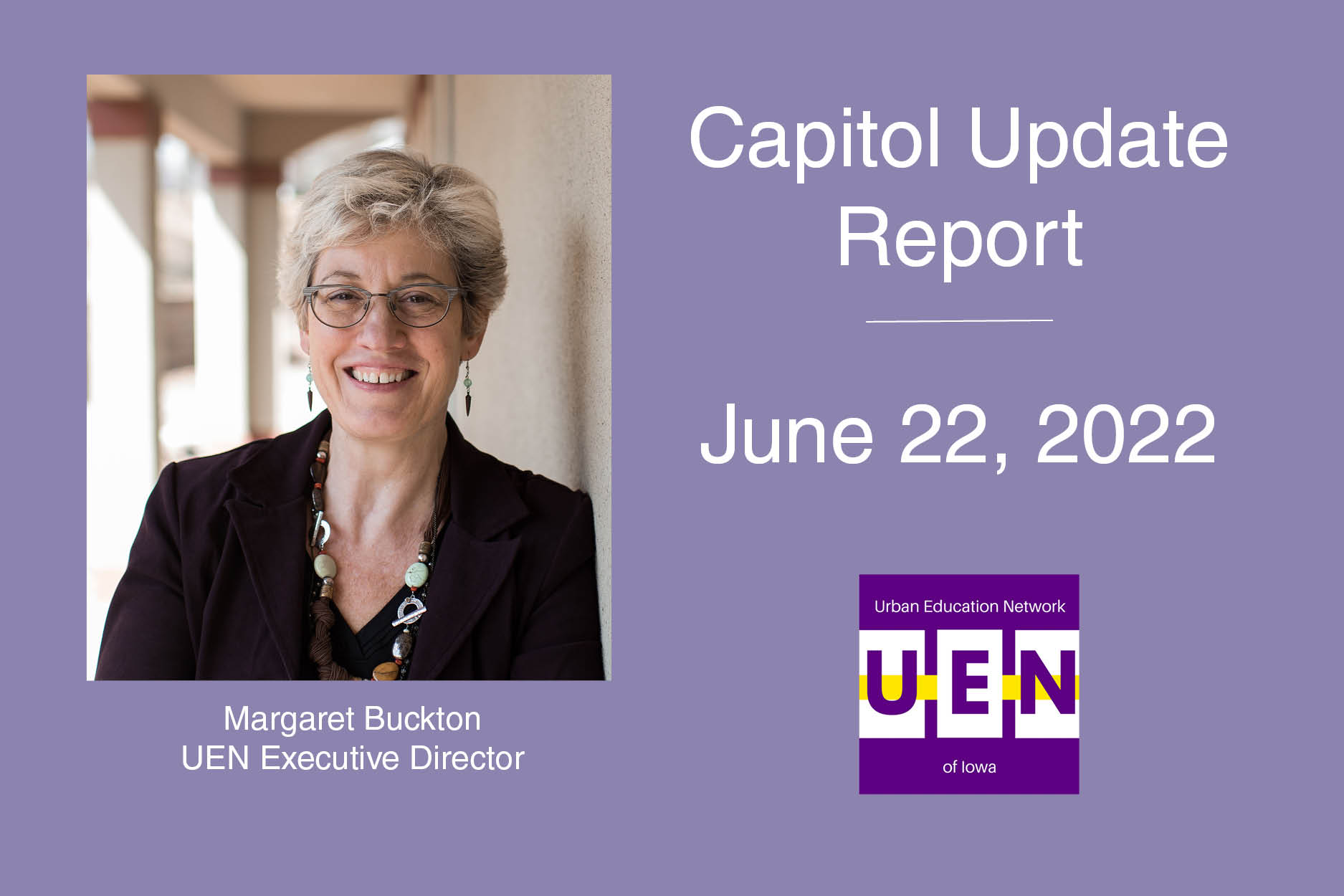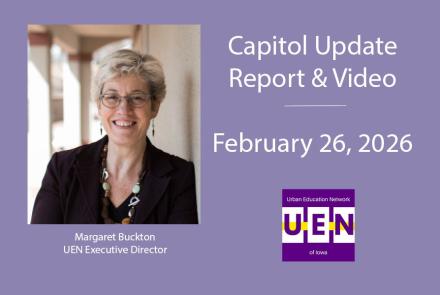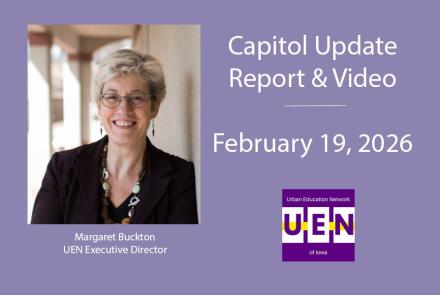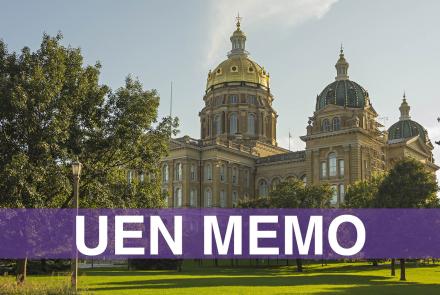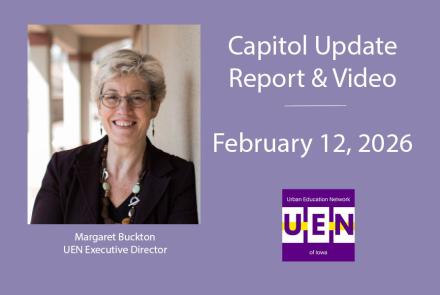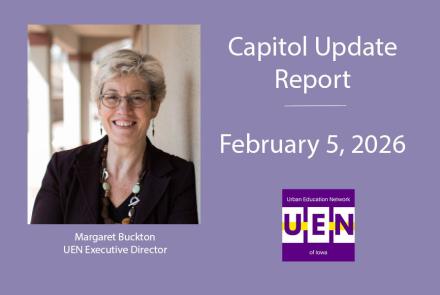Capitol Update - June 22, 2022
UEN Legislative Update
June 22, 2022
Governor completes signing/veto action. This UEN Weekly Report covers the following:
- Funding Bills, including last-minute changes to Open Enrollment Deadlines
- Tax and Revenue Legislation
- Policy Bills Related to Teacher Workforce
- Other Policy Bills to the Governor
- Dead Bills List
- Advocacy before the November 8 General Election
- Advocacy Actions and Links to Advocacy Resources
Governor Reynolds had 30 days following the May 24 close of the 2022 Legislative Session to sign or veto any bills sent to her in the closing days of the Session. She completed that action this week. The following is a list of bills enacted by the 2022 session, as signed by the Governor:
Funding Bills:
HF 2575 Education Appropriations: The following information comes from the LSA’s NOBA publication. This bill appropriates:
- State General Fund: a total of $992.9 million and 11,771.5 full-time equivalent (FTE) positions for FY 2023 to the Department for the Blind, the College Student Aid Commission, the DE, and the Board of Regents. This is an increase of $20.5 million (2.1% increase) and an increase of 4.2 FTE positions compared to estimated FY 2022.
- Other Funds FY 2023: a total of $40.3 million from the Skilled Worker and Job Creation Fund (SWJCF) for FY 2023. This maintains the current level of funding compared to estimated FY 2022.
- Standing Appropriations FY 2023: In addition to the appropriations in this Bill, includes the standing appropriation of $1.8 million to the College Student Aid Commission for Vocational-Technical Tuition Grants.
|
|
Actual FY21 |
Est. FY 22 |
Final |
Final vs. Est. 22 |
|
Community College Gen Aid |
$208,690,889 |
$215,158,161 |
$221,658,161 |
$6,500,000 |
|
Jobs for America's Grads |
$2,666,188 |
$4,666,168 |
$8,146,450 |
$3,480,262 |
|
Therapeutic Classroom Incentive Fund |
$0 |
$1,626,075 |
$2,351,382 |
$725,307 |
|
Mental Health Loan Repayment (CSAC) |
$0 |
$0 |
$520,000 |
$520,000 |
|
Teach Iowa Scholars (CSAC) |
$400,000 |
$400,000 |
$650,000 |
$250,000 |
|
ECI General Aid |
$22,662,799 |
$23,206,799 |
$23,406,799 |
$200,000 |
|
Children's Mental Health Training |
$2,100,000 |
$3,183,936 |
$3,383,936 |
$200,000 |
|
Best Buddies Iowa |
$25,000 |
$25,000 |
$35,000 |
$10,000 |
|
DE Admin |
$5,975,526 |
$5,975,526 |
$5,975,526 |
$0 |
|
CTE Admin |
$598,197 |
$598,197 |
$598,197 |
$0 |
|
CTE Regional Planning Partnerships |
$2,952,459 |
$2,952,459 |
$2,952,459 |
$0 |
|
School Food Service |
$2,176,797 |
$2,176,797 |
$2,176,797 |
$0 |
|
Spec Ed 0-3 Services |
$1,721,400 |
$1,721,400 |
$1,721,400 |
$0 |
|
Early Head Start |
$574,500 |
$574,500 |
$574,500 |
$0 |
|
Nonpublic Textbooks |
$652,000 |
$852,000 |
$852,000 |
$0 |
|
Student Achievement/TQ |
$2,965,467 |
$2,965,467 |
$2,965,467 |
$0 |
|
Statewide Assessment |
$3,000,000 |
$3,000,000 |
$3,000,000 |
$0 |
|
Work-based Learning Clearinghouse |
$300,000 |
$300,000 |
$300,000 |
$0 |
|
Summer Joint Enrollment |
$600,000 |
$600,000 |
$600,000 |
$0 |
|
Attendance Center Website/Data System |
$250,000 |
$250,000 |
$250,000 |
$0 |
|
Online State Job Posting |
$230,000 |
$230,000 |
$230,000 |
$0 |
|
Early Lit-Successful Progression |
$7,824,782 |
$7,824,782 |
$7,824,782 |
$0 |
|
Early Lit-Early Warning System |
$1,915,000 |
$1,915,000 |
$1,915,000 |
$0 |
|
Computer Science PD Fund |
$500,000 |
$500,000 |
$500,000 |
$0 |
|
Adult Education & Literacy Prog |
$500,000 |
$500,000 |
$500,000 |
$0 |
|
Midwestern Higher Ed Compact |
$115,000 |
$115,000 |
$115,000 |
$0 |
|
Nonpublic Concurrent Enrollment |
$1,000,000 |
$1,000,000 |
$1,000,000 |
$0 |
|
Child Development |
$10,524,389 |
$10,524,389 |
$10,524,389 |
$0 |
|
Therapeutic Classroom Transportation |
$0 |
$500,000 |
$500,000 |
$0 |
|
Classroom Behavior Guidelines |
$0 |
$500,000 |
$0 |
($500,000) |
|
Iowa Reading Research Center |
$1,300,176 |
$1,550,176 |
$600,000 |
($950,176) |
|
Total Dept. of Education |
$300,594,416 |
$314,165,699 |
$323,951,092 |
$9,785,393 |
Additional language/policy included in HF 2575:
- Excluded BOEE for Reduction of Fees: Division X of the Bill strikes language referencing the BOEE included in SF 2383 (Workforce Omnibus Bill). SF 2383 eliminated the collection of fees by the BOEE for any first-time licensee w/household income below 200% of the federal poverty level. The addition of this language reverses that action from SF 2383.
- Elementary Reading Assessments: Requires DE to provide reading assessments for PK-6 to identify students not proficient in reading. Allows DE to charge school districts for the cost of the assessment, which school districts may pay out of Early Intervention funds. The NOBA mentioned that DE has not charged school districts for this in the past, even though they have previously had the authority to do so.
- TLC Technical Assistance: Requires DE to give priority to school districts with certified enrollment below 600 students for funds allocated for Teacher Leadership and Compensation technical assistance under the Student Achievement/Teacher Quality appropriation.
- Antibullying Report: Requires DE to submit a written report by Jan. 15, 2023, to the General Assembly describing the DE’s antibullying programming and current and projected expenditures for antibullying programming for FY 2023.
- Mental Health Rural Pilot Report: Requires DE, in collaboration with the statewide not-for-profit health care organization receiving moneys for the children's grief and loss rural pilot program, to prepare a report detailing the expenditure of moneys used for the purposes of the program and its outcomes to the General Assembly by Sept. 30, 2023.
- Charter School Funding Clean-up Language:
- Requires the specified calculated costs per pupil for each student enrolled in a charter school who was not included in the actual enrollment of the district of residence to be paid by DE directly to the charter schools instead of being paid by the student’s school district of residence.
- Requires the school district of residence to pay to a charter school the actual costs of providing appropriate special education as itemized and delivered to the district by the charter school on or before February 15 and July 15 of each year.
- Requires the specified calculated costs per pupil for each student enrolled in a charter school who was included in the actual enrollment of the district of residence to be paid by DE directly to the charter schools for the school year the student was enrolled in the charter school.
- Requires the amount paid to the charter school to be deducted from the payments to the district of residence in the succeeding fiscal year.
- The NOBA states: “An estimated 275 students will attend a charter school who were not included in the actual enrollment of the district of residence for FY 2023. DE will pay to the charter schools an estimated $2,600,000 from the General Fund standing unlimited appropriation for charter school funding during FY 2023.”
- Student Achievement and Teacher Quality Program Funding Allocations. The funds are allocated across the following six programs:
- National Board Certification, which is available to teachers nationwide and requires candidates to demonstrate teaching practices as measured against rigorous standards.
- Ambassador to Education, which is filled by the Teacher of the Year, who acts as an education liaison to primary and secondary schools in Iowa.
-
- Career Development and Evaluator Training, which coordinates a statewide network of PD resources, supports developing teacher quality committees in every school district and AEA, and provides evaluator training to administrators and other school officials.
- Teacher Development Academies, which provide intensive professional development.
- Teacher Leadership and Compensation (TLC) Technical Assistance to support the TLC allocation, which is funded for all school districts through the school aid formula.
- Fine Arts Mentoring, which funds a contract between the Department of Education and the Iowa Arts Alliance that provides PD and mentoring services for beginning fine arts teachers.
- High-Needs Schools: Postpones the allocation of $10,000,000 for high-needs schools out of Student Achievement Teacher Quality funds until the year beginning July 1, 2023. (This was originally part of the 2013 Education Reform Act and has been postponed every year since.)
- iJAG increase of $3,480,262 compared to estimated FY 2022 will be used to start an estimated 151 programs in schools across the State. The iJAG program is a state-based national nonprofit organization dedicated to preventing dropout among students considered most at risk.
- Early Reading Assessments: Requires DE to provide reading assessments for PK-6 to identify students not proficient in reading. Allows DE to charge school districts for the cost of the assessment, which school districts may pay out of Early Intervention funds. Currently, DE provides the assessments at no cost to schools. Local school districts use universal screening and progress monitoring assessments and store student performance data on a statewide database.
- Nonreversion: Allows use of carry-forward funds in many different areas that would otherwise revert (for example, $800,000 for the Iowa Reading Research Center).
- Pandemic Bonuses: DOES NOT include language on the $1,000 pandemic bonuses (that was moved to a larger tax bill also passed in the last two days of Session).
- Superintendent Severance: Does not include language limiting superintendent severance. Those provisions were eliminated from the bill in the Senate.
This bill was signed by Governor Reynolds on June 17. UEN was registered as undecided on this bill.
HF 2589 Standing Appropriations: This bill, typically the last bill approved in a Legislative Session, limits appropriations that would otherwise automatically happen, or “stand” without legislative action. This bill also typically includes last-minute policy language that did not get through the normal process. This year is no exception. The actions of the Standings Appropriations bill include the following:
- Decreases $33.7 million compared to what would be otherwise appropriated, which leaves a total of $4.183 billion (after these reductions).
- Reduces nonpublic school transportation appropriation to $8,997,091 (same as FY 2022).
- Sets ISL state share at zero (legislatures have been deappropriating this mandated state share since 2011).
- Cuts AEAs $17 million, which is a reduction of an additional $2 million and specifies that $2 million must be equal to the AEAs PD district cost determined under section 257.37A, subsection 2, for the budget year beginning July 1, 2022 for implementation of Chapter 284.
- Division V Eliminates the March 1 open enrollment deadline. Requires school boards to act timely on the application. Receiving district may deny application due to insufficient classroom space. Requires DE to write emergency rules to implement this change. Effective on enactment. For purposes of Varsity Athletic Participation, the “good cause” standard must still be met to participate in varsity athletics prior to a 90-day waiting period. The good cause standards as written in this bill include exception for any of the following:
- a change in a child’s residence due to a change in family residence,
- a change in a child’s residence from the residence of one parent or guardian to the residence of different parent or guardian,
- a change in the state in which the family residence is located,
- a change in a child’s parents’ marital status, a guardianship or custody proceeding, placement in foster care, adoption,
- participation in a foreign exchange program, initial placement of a prekindergarten student in a special education program requiring specially designed instruction, or participation in a substance abuse or mental health treatment program,
- a change in the status of a child’s resident district such as removal of accreditation by the state board, surrender of accreditation, or permanent closure of a nonpublic school, revocation of a charter school contract as provided in section 256E.10 or 256F.8, the failure of negotiations for a whole grade sharing, reorganization, dissolution agreement, or the rejection of a current whole grade sharing agreement, or reorganization plan.
- resident and receiving district may mutually agree to allow athletic participation.
This bill was signed by Governor Reynolds on June 21. UEN was registered as undecided on this bill but opposed the open enrollment deadline changes.
Policy Note: check your student handbook and school board policy on open enrollment. Here is some suggested language, however, we encourage districts to have their school attorney review policy changes. The income eligibility threshold for resident district transportation assistance was increased to 200% of the federal poverty level during the 2021 legislative session. The Iowa Code allows the resident district to deduct the transportation assistance from the tuition paid on behalf of the open enrolled student to the receiving district.
Open Enrollment
Students may request to enroll into another school district at any time during the school-year. The district to which the student wishes to open enroll may refuse the enrollment request based on insufficient space as defined in the receiving districts’ school board policy.
Parents/guardians of open enrolled students whose income falls below 200% of the federal poverty guidelines are eligible for transportation assistance. This may be in the form of actual transportation or in the form of a cash stipend.
Restrictions on participation in interscholastic athletic contests and competitions. A pupil who transfers school districts under open enrollment in any of the grades 9 – 12 shall not be eligible to participate in varsity interscholastic contests and competitions during the first 90 school days of the transfer. This restriction also shall apply to transfers resulting from an approved petition filed by a parent or guardian to transfer to an alternative receiving district and when the pupil returns to the district of residence using the process outlined in DE Administrative Rules. The 90-school-day restriction does not prohibit the pupil from practicing with an athletic team during the 90 school days of ineligibility. The 90-school-day restriction is not applicable to a pupil who:
- participates in an athletic activity in the receiving district that is not available in the district of residence.
- participates in an athletic activity for which the resident district and receiving district have a “cooperative student participation agreement” in place as provided by rule 281-36.20(280).
- is requesting open enrollment due to a change in circumstances that meet the definition of good cause exemption from the 90-day waiting period in Iowa Code 282.18, subsection 11, paragraph 1, subparagraph 8, including:
- change in child’s residence due to a change in family residence.
- change in child’s residence from the residence of one parent or guardian to the residence of a different parent or guardian.
- change in the state in which the family residence is located.
- change in a child’s parents’ marital status, a guardianship or custody proceeding, placement in foster care, adoption, participation in a foreign exchange program.
- participation in a substance abuse or mental health treatment program.
- change in the status of a child’s resident district such as removal of accreditation by the state board, surrender of accreditation, or permanent closure of a nonpublic school, revocation of a charter school contract, the failure of negotiations for a whole grade sharing, reorganization agreement, or the rejection of a current whole grade sharing agreement or reorganization plan.
HF 2316 School Funding (SSA) set at 2.5% increase per pupil. Many of the following details come from the LSA’s Fiscal Note.
 Big picture, the State Cost Per Pupil funds districts and AEAs. The formula generates a mix of State aid and property taxes. In general, per pupil amounts provide a ceiling (budget limitation also known as spending authority).
Big picture, the State Cost Per Pupil funds districts and AEAs. The formula generates a mix of State aid and property taxes. In general, per pupil amounts provide a ceiling (budget limitation also known as spending authority).
This chart from the fiscal note shows the five State Cost per Pupil funding levels increased by a 2.50% State percent of growth for FY 2023 with the enactment of HF 2316:
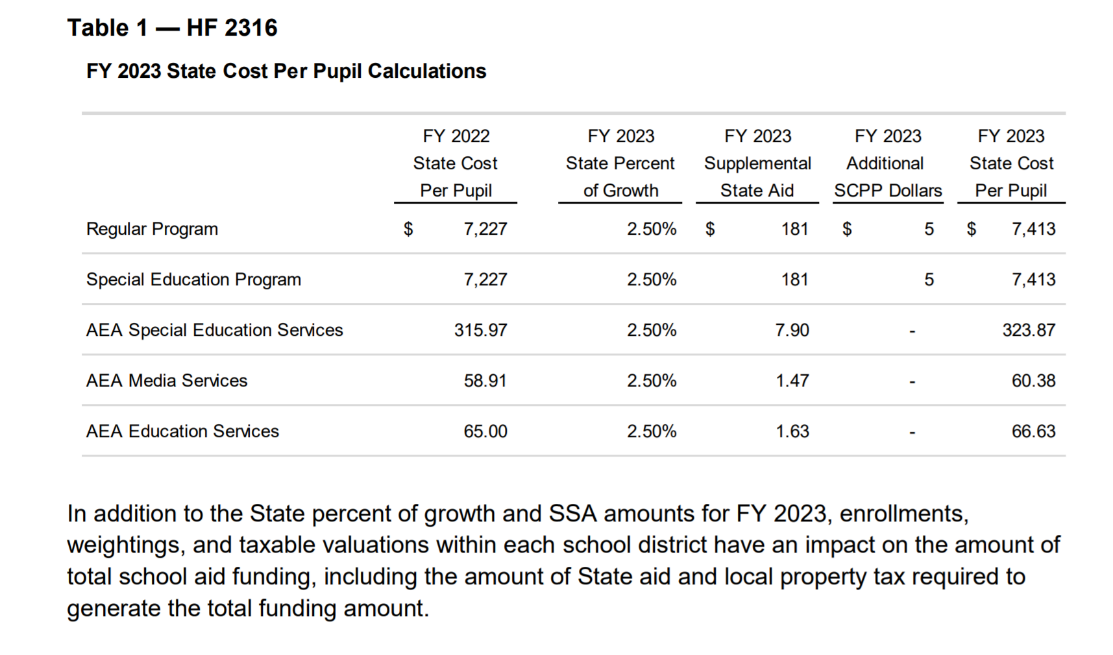
Per Pupil Categoricals for public schools and AEAs are also impacted by the SSA rate. Teacher Leadership and Compensation is the only categorical with a consistent per pupil amount across the state. The others have different per pupil amounts, which all grow by the dollar figure, so it is not exactly 2.5% growth of your district’s per pupil number in Teacher Salary Supplement, for example.
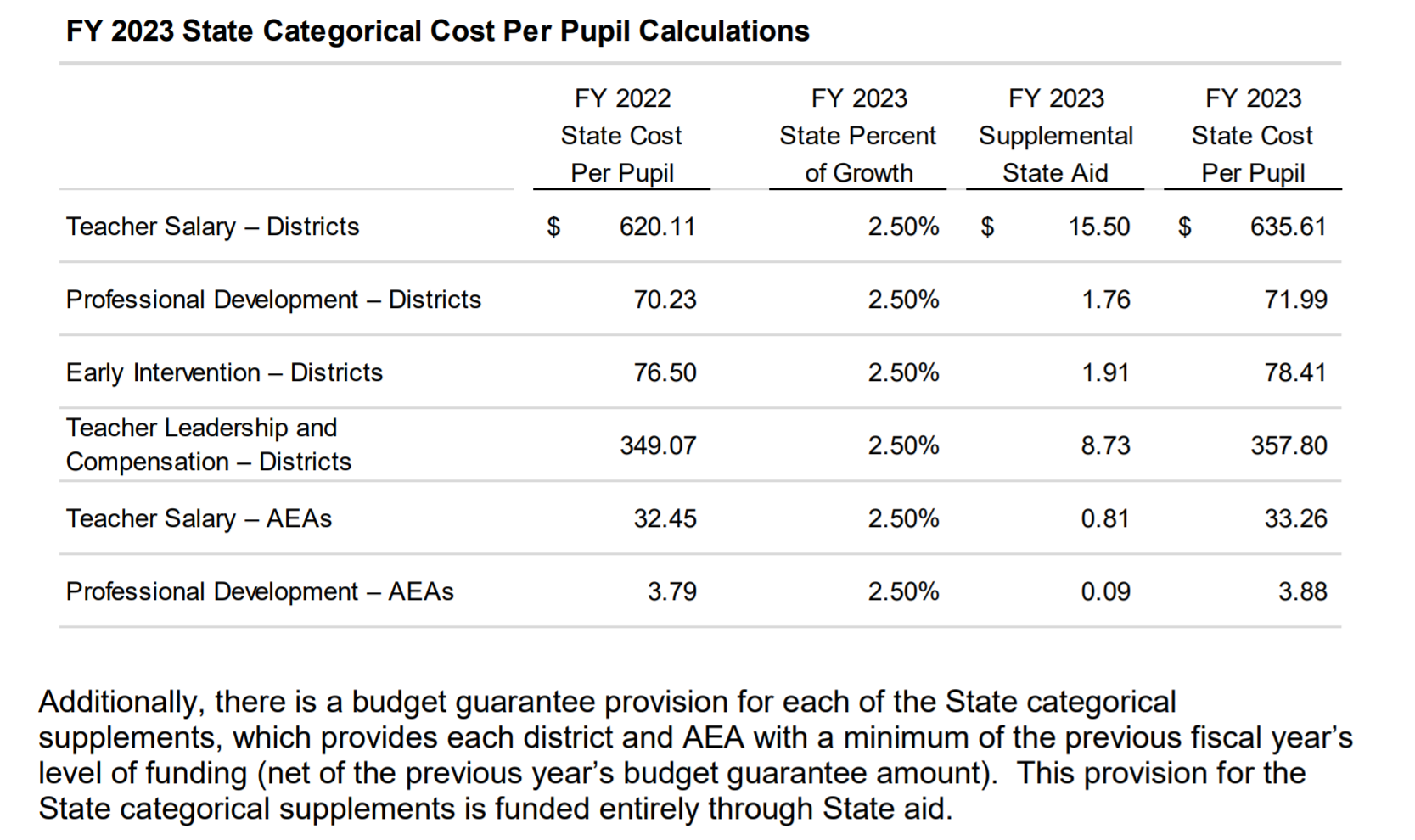
HF 2316 grows the Property Tax Replacement Payment (PTRP) to $175 per pupil. The action lowers the fixed additional levy, capped at $685 per pupil, beginning July 1, 2022. In the 2021 Legislative Session, the foundation threshold was increased from 87.5% to 88.4% foundation level effective in the 2022-23 school year. The increased foundation level and frozen additional levy portion lower property taxes and increase the state cost of the formula, thus changing the mix of funding.
Transportation Equity: the bill appropriates the amount needed to get all districts to the statewide adjusted average. The funding goes up to $29.5 million, which is an increase of $2.0 million, or a 7.28% increase. Here’s a description from the Fiscal Note:

The following tables, also from the Fiscal Note, show the state and property tax dollar amounts per pupil and total, percent and dollar changes, and other details regarding the fiscal impact to the state of HF 2316:
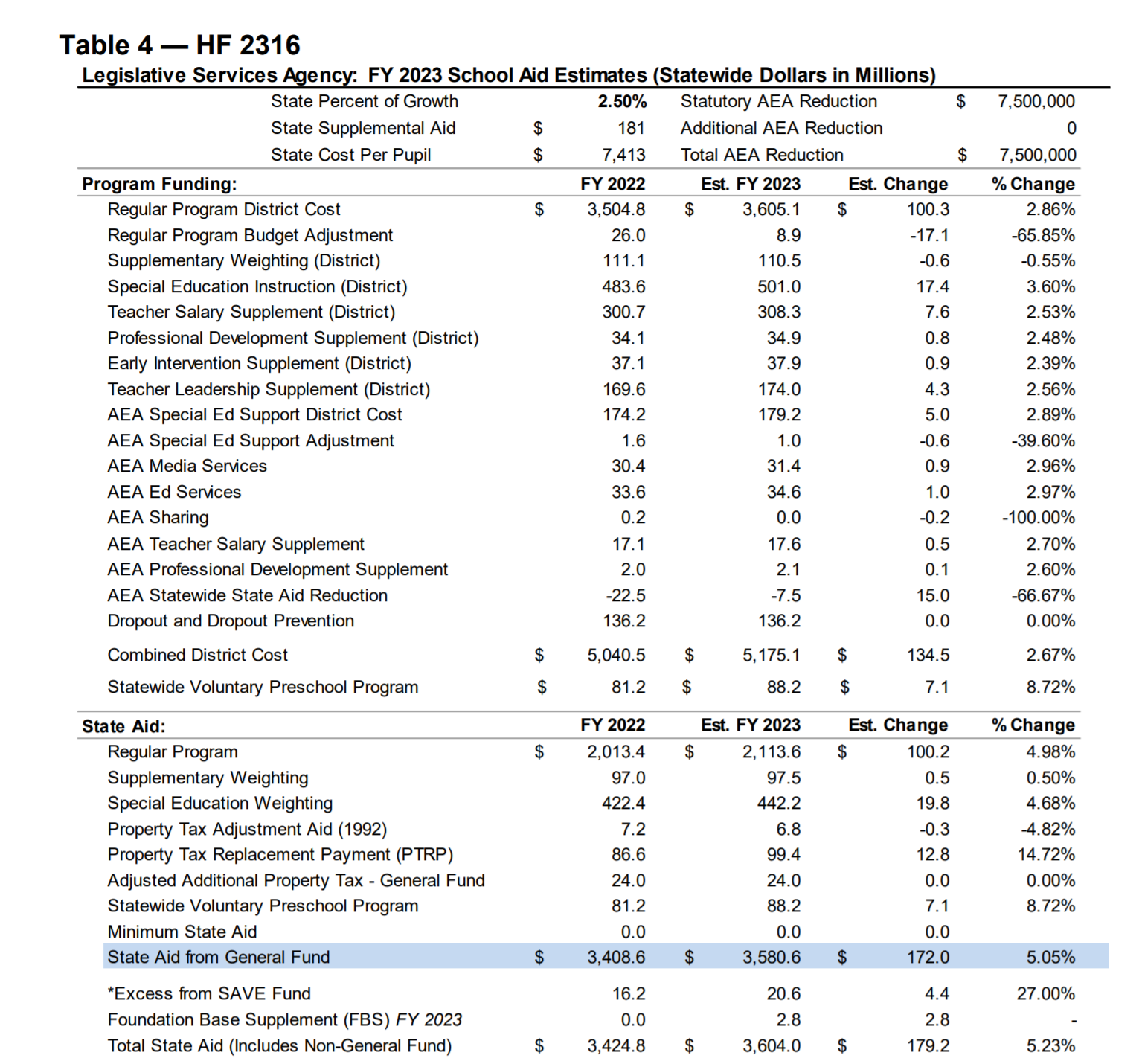
Note: The $15 million increase to AEAs is on this table due to the timing of the legislation, as this bill was enacted early in the Session. The AEAs were actually cut $17 million in the Standings Appropriations bill at the close of the Session. Total state investment to fund the 2.5% SSA is an increase of $155 million, or 4.74% increase in state foundation aid, compared to property taxes shown on the next table. Property taxes increase 0.67% in their contribution to the total formula. This bill was signed by the Governor on Feb. 17, 2022. UEN was registered as undecided.
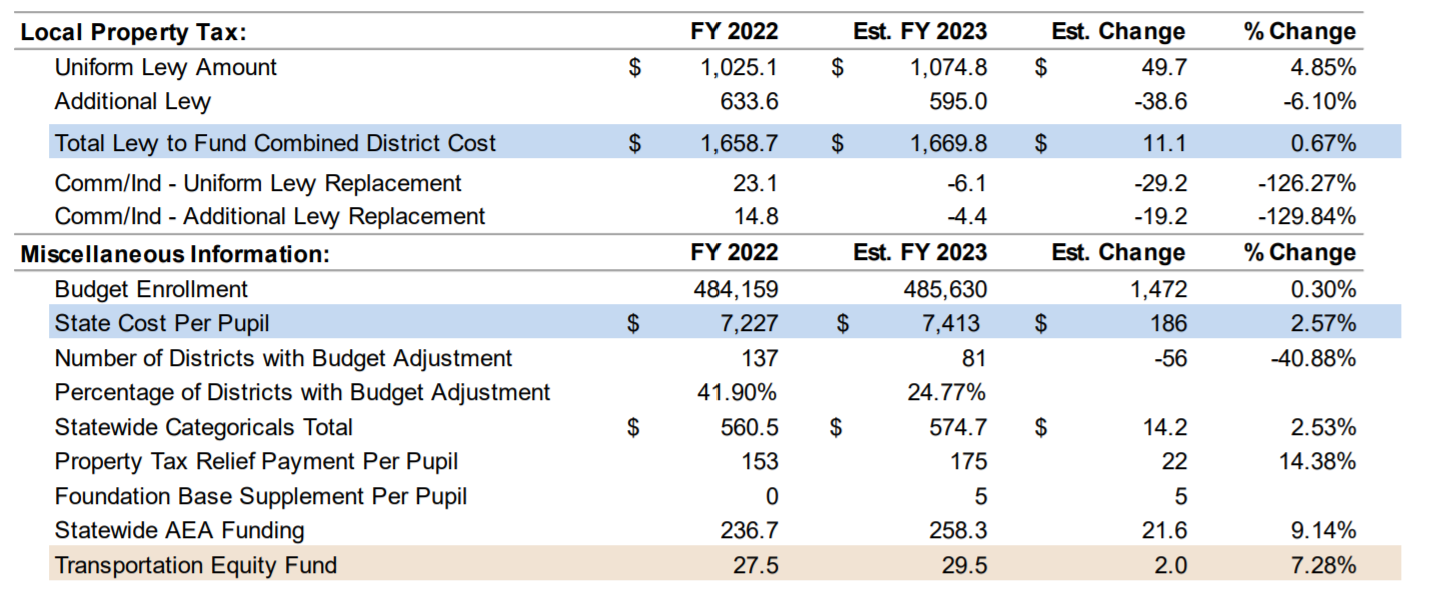
HF 2564 Economic Development Appropriations: appropriates $250,000 to Iowa Workforce Development for a Future Ready Iowa Summer Youth Intern Pilot Program intended to help young people at-risk of not graduating from high school explore and prepare for high-demand careers through summer work experience, including the development of soft skills. Maintains the current funding level compared to estimated FY 2022. The Program began with the enactment of HF 2493 (FY 2019 Economic Development Appropriations Act) during the 2018 Legislative Session.
The bill also appropriations $1,492,042 to the Iowa Public Employment Relations Board (PERB), which is status quo funding level for FY 2023 (same as FY 2022). The appropriation is used for implementing the provisions of the Public Employment Relations Act (PERA), and for adjudicating and conciliating labor/management disputes involving public employers and employee organizations throughout the State. The bill requires the allocation of $15,000 for a searchable website containing collective bargaining information. UEN was not registered on this bill. Governor Reynolds signed it on June 17, 2022.
HF 2579 RIIF and TRF Appropriations: this bill appropriates funds from the Rebuild Iowa Infrastructure Fund and Technology Reinvestment Fund (revenues generated from lottery and gambling in Iowa) for many things, of which the following impact education:
- Department of Education (DE) ICN Part III Maintenance and Leases: Appropriates $2.7 million from the TRF to the DE for maintenance and lease expenses associated with Part III fiber connections for the Iowa Communications Network (ICN).
- Public Broadcasting Equipment: Appropriates $1.0 million from the TRF to the DE for Iowa Public Broadcasting Service (PBS) to replace existing broadcasting equipment.
- Statewide Interoperable Communications System: Appropriates $4.3 million from the RIIF to the DPS to fund lease payments and maintenance of the Statewide Interoperable Communications System.
- Department of Revenue (IDR) Tax System Modernization: Appropriates $4.1 million from the TRF to the IDR to continue updating information systems used for tax administration.
This bill was signed by Governor Reynolds on June 17, 2022. UEN did not register on this bill.
Tax and Revenue Legislation
HF 2416 Income Tax Reduction: the following table from the HF 2316 Fiscal Note shows the expected impact of these historic income tax cuts on the state general fund. The bill phases in a 3.9% flat income tax rate through FY 2026, exempts retirement income, lowers the corporate tax rate to a fixed 5.5% and makes other changes. The biggest reductions in state General Fund hit the balance sheet in FY 2026 and beyond, as the following table shows. The Governor signed this bill on March 3. UEN opposed this tax reduction, which will make it even more difficult to adequately fund public schools in the future.
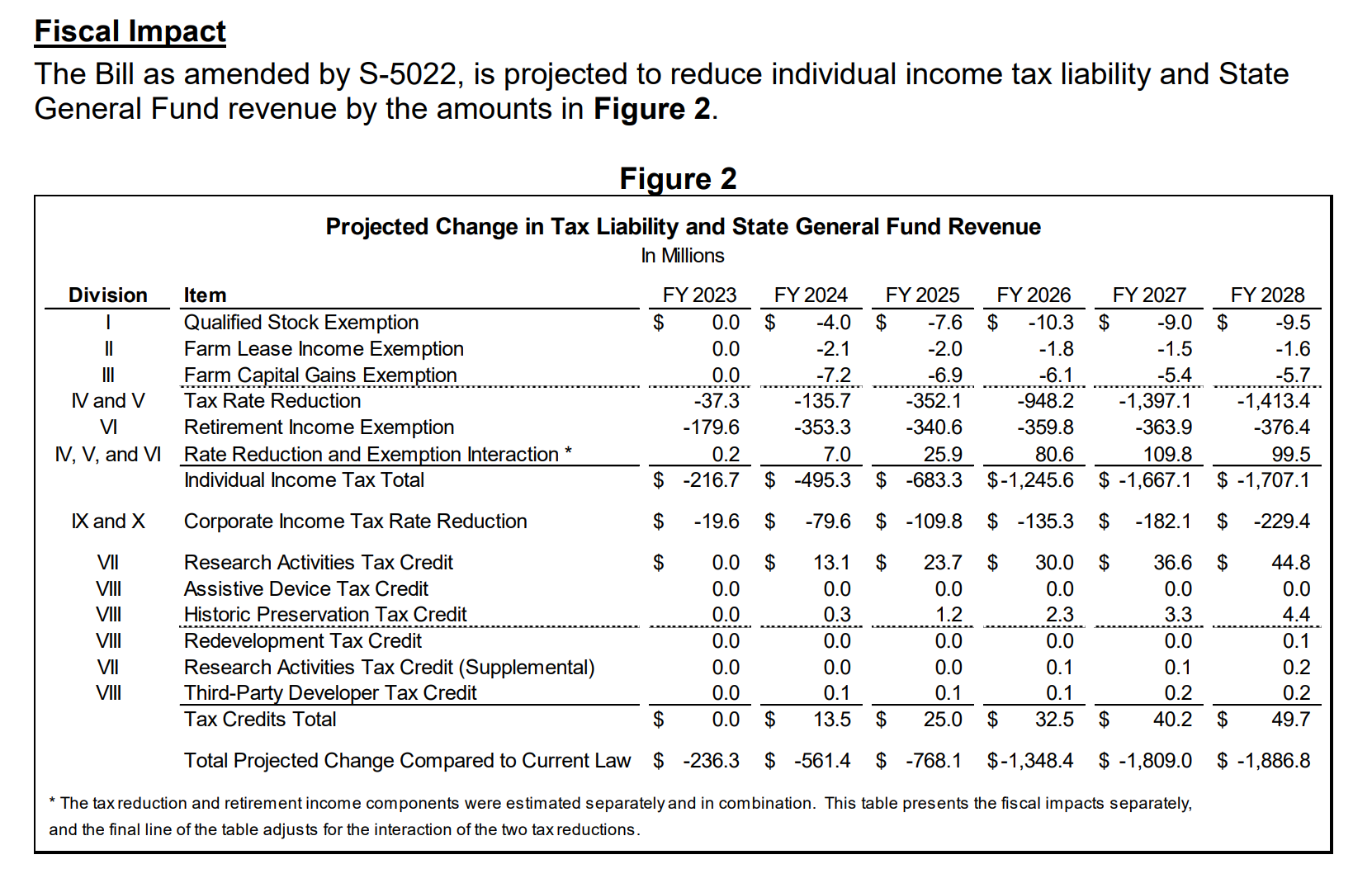
SF 2367 Sales Tax Matters: this bill exempts some items from sales tax and eliminates the sales/use tax exemption on the sales prices from the sale or rental of computers or computer peripherals by an insurance company, financial institution or commercial enterprise. Those combined actions have a slight impact on SAVE fund distributions for school districts, as shown in this table from the Fiscal Note:
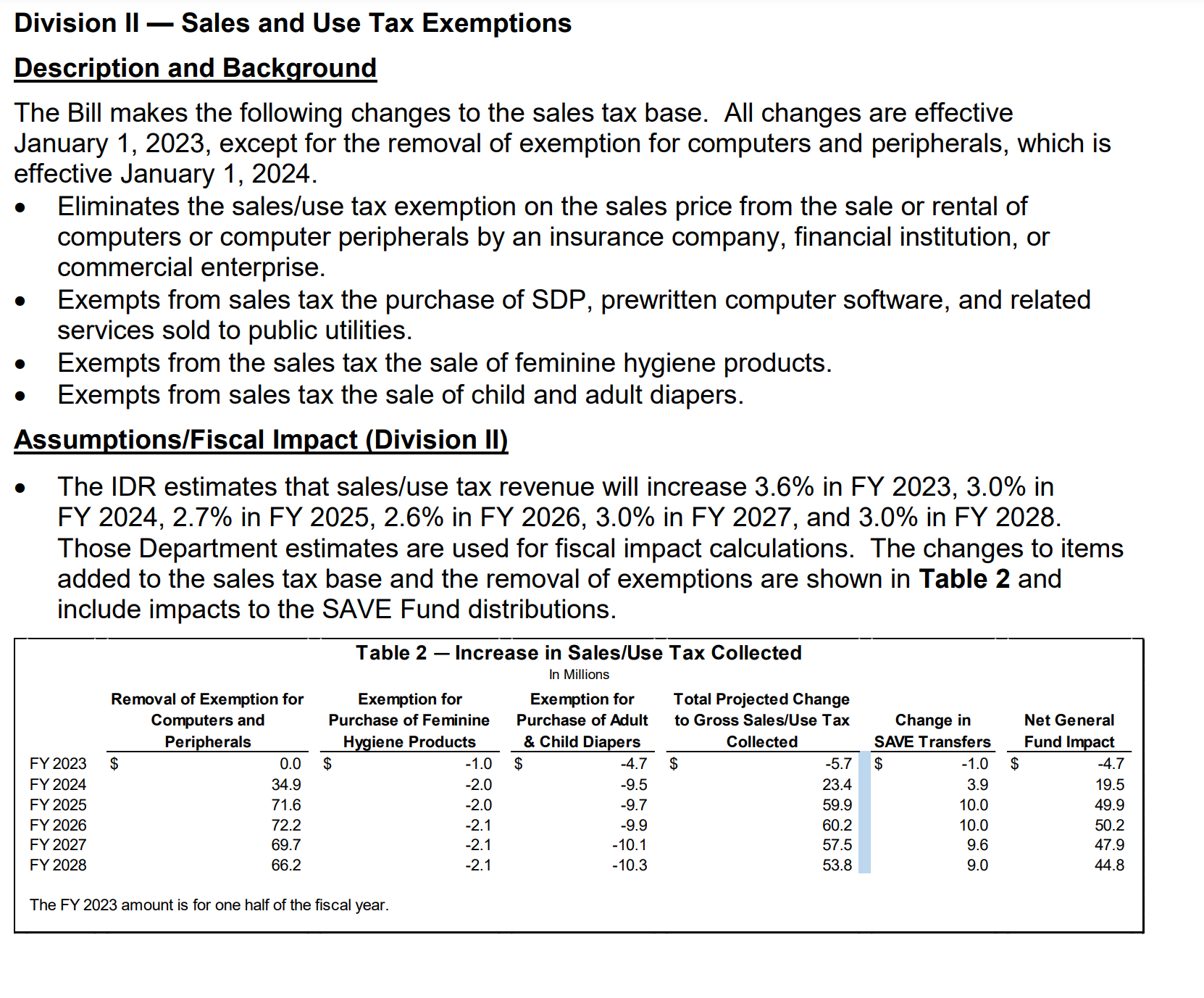
The bill also exempts calendar year 2022 bonuses paid to certain categories of workers as determined by the Governor’s pandemic retention bonus payments from state income tax. Watch for additional guidance, but this will most likely be handled between teachers and their tax preparers when filing taxes next year. Governor Reynolds signed this bill on June 17, 2022. UEN was registered as undecided.
SF 2366 Wind Energy Conversion: this bill corrects current law that allows wind turbine repair to reset the valuation schedule, which has the effect of postponing property valuation growth (impacts local levy capacity and increases state aid to account for it). The bill states that maintenance, refurbishing, and/or repowering of the property shall not cause the project to receive the benefit of a new valuation schedule. The Governor signed it on May 23, 2022. UEN supported this bill.
Policy Bills Impacting Teacher Workforce
- HF 2081 Praxis: eliminates the requirement that practitioner preparation program admissions candidates and/or teachers pass the PRAXIS test for admissions, licensure or employment. Directs colleges to notify alumni that previously did not deliver a score above the passing threshold on the PRAXIS that the requirement is no longer a restriction. Governor Reynolds signed it on June 13, 2022. UEN supported this bill.
- HF 2165 Future Ready Workforce Scholarships: allows part-time students to qualify for scholarship support. Educators are included in the shortage area positions. This flexibility could blend with the Governor’s Teacher and Para-education registered apprenticeship program or other efforts to attract and recruit individuals to teaching positions. Governor Reynolds signed this bill on June 13, 2022. UEN supported it.
- HF 2198 Child Care Staffing: lowers minimum age requirements for employees who independently care for children to age 16 and increases staff-to-child ratios. Governor Reynolds signed it on June 16, 2022. UEN was registered as undecided.
- HF 2493 Paras as Subs: allows para-educators holding substitute authorizations to substitute in any Pk-12 classroom except drivers’ education during the 2021-22 school year. Requires the school district to make a good faith effort to hire a teacher and allows BOEE to make emergency rules. Governor Reynolds vetoed the bill on June 17, 2022. Her veto message stated that this bill would limit the flexibility to the 2022-23 school year, whereas the administrative rules moving forward through the Board of Educational Examiners will grant this flexibility indefinitely. UEN supported the bill, but also supports the administrative rules and the Governor’s action in this specific case.
- HF 2549 MH Professional Loan Repayment Fund: establishes the fund in the College Student Aid Commission. Requires the mental health professional to work in Iowa for at least 5 years if full-time and at least 7 years if part-time in order to be a recipient of the local repayment grants. Governor Reynolds signed it on June 13, 2022. UEN supported the bill.
- SF 2266 IPERS Earning Limits: increases the income threshold of an IPERS benefits recipient under the age of 65 employed by an IPERS employer from $30,000 to $50,000 without loss of IPERS income. IPERS retirees still need to fulfill the bona fide retirement period of four months. IPERS has a brochure that explains the requirements, which can be downloaded from here: https://ipers.org/sites/default/files/publication_2022-04/BFR_2022-3rev.pdf. The bill also increased the conflict of interest threshold for a school board member who receives income from their school district from $6,000 to $20,000. (Note: Please check your school board policies and employee handbooks for any references to IPERS thresholds or conflict of interest that need to be updated. A more limiting board policy would be legal but would also limit your district’s ability to access this flexibility.) Signed by the Governor March 23, 2022. UEN supported it.
- SF 2383 Governor’s Workforce Omnibus Bill: Governor Reynolds signed this bill on June 16, 2022. UEN was registered as undecided. Provisions impacting schools in this bill include:
- Division II Work-Based Learning: requires annual reporting by the boards of directors of school districts on student work-based learning participation. The programs required to be reported include registered apprenticeships, quality pre-apprenticeships, internships, on-the-job training, and projects through the Iowa Clearinghouse for Work-Based Learning. Makes changes to Iowa Code section 272.1 by adding the definition of “work-based learning program supervisor” as a person who is certified to supervise students’ opportunities and experiences related to workplace tours, job shadowing, rotations, mentoring, entrepreneurship, service learning, internships, and apprenticeships. Requires BOEE to adopt rules for the certification of work-based learning program supervisors. Certification must include instruction related to fundamentals in career education, curriculum, assessment, and the evaluation of student participation. Requires the 8th grade career plan to include that school district, prior to graduation, advise the student how to successfully complete the FAFSA.
- Division IV Military Spouses: expedites the process of licensing for military and military spouses. Added BOEE to list of licensing entities required to waive licensing fees for first-time applicants below 200% of the FPL (this provision was removed in the Education Appropriations bill HF 2575). Strikes a requirement for the licensee to have been licensed for at least one year in another jurisdiction to receive a license in Iowa without an examination. (This provision is not specific to military or spouses.)
Other Policy Bills Enacted in the 2022 Legislative Session
- HF 604 Deaf and Hard-of-Hearing Children: directs the DE to appoint an Early Language Development Consultant and assign duties to the Consultant including the development and dissemination of resources to parents and educators. The Bill establishes a language assessment program with the purposes of assessing, monitoring, and tracking the language development milestones of children who are deaf or hard-of-hearing. The DE is directed to establish an advisory committee, and membership is detailed in the Bill. The DE is required to publish an annual report regarding language and literacy development for deaf and hard-of-hearing children from birth through 8 years of age. Signed by the Governor May 24, 2022. UEN was undecided.
- HF 2080 Operational Sharing: adds a school resource officer (SRO) at 3-student weighting. In another section of Iowa Code which is not changed by this legislation, all positions which generate weighting equivalent to 3 students is lowered to a weighting equivalent of 2 students. (IC 257.11 subsection 5(b). The bill also allows an individual to provide different sharing functions (could be HR director in one district and SBO in another, for example). Governor Reynolds signed the bill on June 13, 2022. UEN was undecided.
- HF 2127 Child Care Family Payments: allows childcare facilities to charge fees to parents above the state contribution to childcare assistance payments. Governor Reynolds signed the bill on June 13, 2022. UEN was undecided.
- HF 2298 COVID Immunization: prohibits school districts, child care centers, and postsecondary schools from requiring COVID immunization for enrollment through July 1, 2029. Governor Reynolds signed it on June 14, 2022. UEN was opposed.
- HF 2330 E-Delivery of Insurance Notices: allows a sponsor or policyholder of a group health plan to consent to notices and documents delivered by electronic means, unless there is a federal requirement for a specific mode of delivery, on behalf of the sponsor or policyholder's covered employees and covered persons. For such consent to be effective, the sponsor or policyholder is required to do many things, so check the link for the details if interested. UEN did not register on this bill. The Governor signed it on May 2, 2022.
- HF 2355 Unemployment Insurance Benefits: limits total compensation to 16 weeks (current law is 26 weeks). (FYI: the legislature did not get consensus to require a one-week waiting period.) The Fiscal Note estimates reduction in statewide benefits paid of about $70 million. Will reduce UE compensation funds paid by employers over the long haul. Governor Reynolds signed this bill on June 16, 2022. UEN did not register on this bill.
- HF 2412 Radon Testing and Mitigation: requires public school districts to establish a radon plan and have at least one short-term radon test done at each attendance center by July 1, 2027, and at least once every 5 years thereafter. Testing will be based on recognized national standards that outline school radon testing practices. If the results of the initial testing are above a specified level, additional testing and potential mitigation would be required within 2 years of the first test. Mitigation would not be required if the school district intends to abandon the building within 5 years or has a plan to renovate the attendance center within 5 years and the renovation will include radon mitigation. All new school construction will incorporate radon-resistant construction techniques. Adds radon testing and mitigation to the list of permissible uses of revenues from the SAVE fund. Signed by the Governor May 24, 2022. UEN was registered in support.
- HF 2416 Athletic Eligibility by Gender: prohibits a student assigned male gender at birth from participating in girls’ sports events for school districts, accredited nonpublic schools, regents’ universities, community college and private accredited colleges/universities. Effective on enactment March 3, 2022, which was when the Governor signed it. UEN was opposed.
- HF 2507 Juvenile Justice: Division X of this bill establishes juvenile justice Early Intervention and Follow-up Programs, contingent on a specific appropriation for juvenile delinquent graduated sanctions services. The bill requires that juvenile court services a. Develop or expand programs providing specific life skills and interpersonal skills training for adjudicated delinquent youth who pose a low or moderate risk to the community, b. Develop or expand a school-based program addressing truancy and school behavioral problems for youth ages 12-17, c. Develop or expand an intensive tracking and supervision program for adjudicated delinquent youth at risk for placement who have been released from resident facilities, including telephonic or electronic tracking and monitoring and intervention by juvenile authorities, and d. Develop or expand supervised community treatment for adjudicated delinquent youth who experience significant problems and who constitute a moderate community risk. The bill requires the supreme court to prescribe rules to implement this program. Governor Reynolds signed this bill on May 24, 2022. UEN was not registered on the bill.
- HF 2573 Response to Opioid Use: appropriates $3.8 million from the Opioid Settlement Fund to the Department of Justice for a medication addiction treatment program administered by the University of Iowa Hospitals and Clinics. Unencumbered or unobligated funds will revert to the Opioid Settlement Fund on July 1, 2024. Allows a school district to obtain and maintain opioid antagonist medication. Allows a school employee to possess and administer an opioid antagonist to an individual if the school employee reasonably and in good faith believes that the individual is experiencing an opioid-related overdose. Also provides that a school employee acting reasonably and in good faith will be immune from liability for any injury arising from the provision, administration, or assistance in the administration of an opioid antagonist. Governor Reynolds signed is on June 13, 2022. UEN was registered as undecided.
- SF 183 Construction Manager At-Risk: prohibits governmental entities from utilizing the fee-based selection of an architect, landscape architect, or engineer for a public improvement. Adopts new definitions for “construction manager-at-risk,” “governmental entity,” “guaranteed maximum price contract,” and other terms. Authorizes a governmental entity to enter into a guaranteed maximum-price contract for the construction of a public improvement. Adopts procedures and requirements including public disclosures, a request for qualifications, a request for proposal, and the selection of bid winners. Prohibits all governmental entities from entering into a design-build contract for the construction of a public improvement. Prohibits governmental entities from entering into a guaranteed maximum price contract for public improvements relating to highway, bridge, or culvert construction. Governor Reynolds signed it on June 14, 2022. UEN was registered as undecided.
- SF 2080 Student Health Screenings: prohibits charter and public schools from administering an invasive physical examination or health screening to a minor student not required by state or federal law without first obtaining a parent’s written consent. Exempts examinations or screenings in emergent care situations. Defines invasive physical examination and student health screening and specifies that a student health screening does not include an episodic, individual screening done in accordance with professionally licensed practice. Signed by the Governor May 2, 2022. UEN was registered undecided.
- SF 2128 EL Terminology: changes references throughout the Iowa Code from limited-English proficient to English Learner. Signed by the Governor April 21, 2022. UEN was undecided.
- SF 2197 Special Education Task Force: requires the DE to establish a task force to study and make recommendations regarding how to better serve students enrolled in nonpublic schools who receive special education services, especially those students who reside in rural areas of the state. Specifies membership in the task force. Requires the task force to submit a report of findings and recommendations by Dec. 1, 2022. Signed by the Governor April 21, 2022. UEN was undecided.
- SF 2279 Electronic Submission of Bids: allows notice to bidders for public improvement projects to provide receipt in an electronic format as determined by the governmental entity. Requires if bids are received in an electronic format, the governmental entity shall electronically record the date and time each bid is received. Signed by the Governor April 21, 2022. UEN supported it.
- SF 2322 Public Records Fees: requires fees charged for public records be reasonable. Requires the custodian of public records make every reasonable effort to provide the records at a fee that does not exceed the cost of copying the records if it will take less than 30 minutes to accomplish that. If expenses are necessary, they must be reasonable and communicated to the requester at the time of the request. Sets a process for appealing the reasonableness of the fees. Prohibits including legal fees except for the redaction of confidential record information. Signed by the Governor May 2, 2022. UEN was undecided.
- SF 2380 George Washington Carver Day: Established Feb. 1 as George Washington Carver Day. Governor Reynolds signed it on June 16, 2022. UEN was undecided.
- HF 771 Bronchodilators: adds self-administration of bronchodilators to Iowa Code 280.16, if parents provide written authorization, the school district notifies the parent in writing that the school does not have liability related to the self-administration, a healthcare professional provides written statement regarding the student’s use of the medication, for a period of one-year which must be renewed annually. Allows the district to withdraw the privilege if the student misuses the privilege. Allows health care professionals to provide a prescription to a school district to stock bronchodilators and allows trained school professionals to administer the medication in good faith, including protection from liability. Governor Reynolds signed it on June 14, 2022. UEN was undecided.
Dead Bills: These bills did not make it to the Governor’s desk. Although none of these bills remain alive to start the next Session, we fully expect to see many of them introduced again beginning in 2023.
- HF 2008 and SF 2003 At-risk DoP Equity. UEN supported.
- HF 2083 Teach Iowa Scholar Grant Eligibility. UEN supported.
- HF 2500 Alternative Teacher Certification. UEN opposed.
- HF 2418 Civics Instruction/INS Test. UEN opposed.
- HF 2176 and SF 2364 Obscene Materials Civil Penalty. UEN opposed.
- HF 2177 Live Classroom Video Feed. UEN opposed.
- HF 2182 AEA Consolidation. UEN opposed.
- HF 2315 Supplemental Appropriation ($19.2 Million). UEN supported.
- HF 2398 Permanent Teacher License. UEN was undecided.
- HF 2580 AEA Funding Changes. UEN supported.
- HF 2498 Gov’s Omnibus #1 (OE, Librarians, home school sped). UEN was undecided.
- HF 2499 Gov’s Omnibus #2 (transparency and social studies). UEN opposed.
- HF 2567 Mandatory Reporter/Teacher Misconduct. UEN was undecided.
- HF 2577 Transparency. UEN was undecided.
- SF 2081 Computer Science Grants Extension. UEN supported.
- SF 2205 Parents Rights. UEN was undecided.
- SF 2348 Significant Open Enrollment in MSA. UEN was undecided.
- SF 2356 Volunteer Substitutes. UEN was undecided.
- SF 2357 Board Members Voting in Person. UEN was undecided.
- SF 2358 Achievement Gap Study. UEN was undecided.
- SF 2359 Technology and Learning Workgroup: UEN was undecided.
- SF 2362 E-Notice, Board Operations (Seizure Training Mandate removed). UEN supported.
- SF 2377 Teacher Recruitment Omnibus (management fund for incentives, teacher intern licensure, Teach Iowa Scholar Loan changes). UEN supported.
- SJR 2006 Constitutional Amendment 2/3rd Majority for Tax Increases. UEN opposed.
Politics of School Choice in November 8 General Election:
Due to redistricting following the Census, you may have a different district number and/or Representative and Senator for the November 2022 election than you have this year. Check for your new legislative district number by entering your address in the search bar on the redistricting page: https://iowa- legis.maps.arcgis.com/apps/instant/lookup/index.html?appid=d32118cf09ed47beacd12742c1cf3fb3
Then check out the Iowa Secretary of State list of General Candidates to confirm if you have new faces that might be representing your school district leading up to and following the Nov. 8, 2022 General Election.
Although there were some media reports of the Governor weighing in on some primaries, passage of vouchers in the 2023 Session is a long way off. Advocates can connect with candidates before the election to give them information about the impact and to shore up opposition. Contact us for hints and resources to prepare your conversation for a successful outcome. UEN will have an updated Issue Brief on school choice and on funding and teacher shortages in the next month. Take a breather, but come back ready to engage by the end of July.
Advocacy Actions
Use many of the advocacy tools provided during the Session to review issues with candidates, before the primary, and then again before the General Election on Nov. 8, 2022. Sit down with candidates from both parties and discuss the impact of education savings accounts or vouchers on your school district and students. Use the UEN Issue Brief on school choice or contact us and we will get you information to share about the experience of vouchers in other states. Teacher shortage and teacher salary are also topical issues for the 2023 Session.
Send a note to your legislators: This is a good time to circle back and reinforce your local connections. Thank them for working on teacher shortage policies and for being there to represent you and your district. If they had committed to you their opposition to vouchers, you could thank them for that as well.
Find Representatives here: https://www.legis.iowa.gov/legislators/house
Find Senators here: https://www.legis.iowa.gov/legislators/senate
Connecting with Legislators during the Interim: check with your legislators soon how best to reach them when they are not in Session. Many use their campaign or personal email addresses rather than the email address at the Capitol. The House and Senate Switchboard phones are not in use unless they are in Session, but you can likely find their phone number and email address on that Secretary of State’s link above if they are in either the primary or the general election (that is all House Representatives and half of sitting Senators). They may tell you email, text message or phone call is the best way to connect with them during the Interim, based on their personal preferences.
UEN Advocacy Resources: Check out the UEN Website at www.uen-ia.org to find Advocacy Resources such as Issue Briefs, UEN Weekly Legislative Reports and Weekly Capitol Video Updates, UEN Calls to Action when immediate advocacy action is required, testimony presented to the State Board of Education, the DE or any legislative committee or public hearing, and links to fiscal information that may inform your work. The latest legislative actions from the Statehouse will be posted at: www.uen-ia.org/blogs-list. See the 2022 UEN Advocacy Handbook, which is also available from the subscriber section of the UEN website for advocacy ideas during the Interim.
The UEN Legislative Digest of the 2022 Legislative Session will be posted soon on the UEN Legislative page, so stay tuned.
Contact us with any questions, feedback or suggestions to better prepare your advocacy work:
Margaret Buckton
UEN Executive Director/Legislative Analyst
margaret@iowaschoolfinance.com
515.201.3755 Cell


